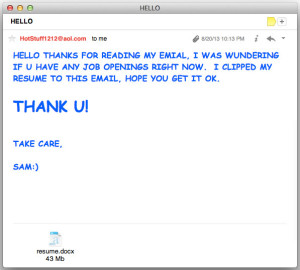Guest Post by Lauren Phillips ’16
 As a continuation of Preregistration Week, today’s guest post is by Lauren Phillips who provides some helpful tips on how to write professional emails.
As a continuation of Preregistration Week, today’s guest post is by Lauren Phillips who provides some helpful tips on how to write professional emails.
As a college student involved in several different organizations, I have to communicate with different people all the time. My inbox is flooded with emails on a daily basis. Some of these emails are spam; some are just announcements, alerts, or reminders. But many require some form of response from me. Similarly, I send emails daily for any number of reasons to a wide range of people. I email friends, family members, professors, administrators, potential employers, internship coordinators, and dozens of other people.

To summarize, I send a lot of emails. Everyone does. Email has become the most important medium for workplace or business communication, but many people still don’t know how to use it correctly.
Everyone who wants to be at least moderately successful professionally should know how to send an appropriate email. For professional writers, especially, this is crucial. How can someone expect to be taken seriously as a writer if he or she can’t craft a legible email? By communication professionally, writers prove that they can be trusted with more important assignments. They prove that they have personal authority and, through that, can gain professional authority.
In CUPID Studio, I’ve had to contact professors, students, and faculty in the English department to gather information for The Back Cover, the department’s newsletter. I haven’t met several of these professors or students, and I don’t know if I will take classes with them or have to work with them in some capacity in the future. Even if I never meet them in person, I’d like to leave them with a favorable impression of me. People respect those who treat them with respect, and if I want to be seen as a professional or a good student, I need to treat others with the respect I would like to be given.
Below, I’ve included a list of ways to make your emails appropriate, professional, and effective. Remember that every situation is different, though, and be prepared to adapt every email to the situation.
Pay attention to the rhetoric situation. Know who you’re emailing and what you want to convey with your message, and remember: Sometimes how you say something is more important than what you’re saying. Use what you know about your contact and the situation to adapt your message to the context.
1. Write in the subject line.
It doesn’t need to be a complete sentence, but you should have some information related to the email’s content so your recipients know what to expect.
2. Have a salutation.
Greet your reader. Even if it’s as simple as a “Hello,” you should have some greeting before you begin the body of your message. This can be adapted depending on who you’re emailing, but generally you should include your recipient’s name in the greeting.
3. Keep an appropriate tone.
Don’t use slang, emoticons, abbreviations, or swear words when you write professional emails. Use the same language you would use when speaking with your contact in person. This includes correct spelling and proper grammar.
4. Use a signature.
Make sure your recipients know who is sending the email. If you’re emailing a stranger or someone you’re not very familiar with, use your full name. If you’re emailing a friend or a close professor, your first name should be enough.
These tips should help you avoid making a fool of yourself over email, but there are thousand of other things you can do to be the best possible communicator. You can click on the links below for more advice:
http://www.videojug.com/film/how-to-improve-your-e-mail-etiquette

 Follow
Follow